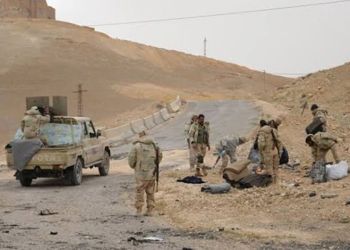This post is also available in:
![]() العربية
العربية
The society of Deir Ezzor province is somehow characterized by its conservative and religious aspects, with interaction between civilians dominated by established norms of heritage and religion. Women in general have a social role within this society in both the city and the countryside. In the rural areas, women used to help their husbands with agriculture and in the cities, they previously worked in nursing and as teachers. And, at the same time, they had remained housewives who were able to balance the work and home life. They maintained their honor, their moral dignity and their religious heritage. They were even called the sisters of men.
As the Syrian Revolution began, women started taking part in all aspects, including firefighting, nursing, rescue teams for collapsed buildings and women were an example of sacrifice. Many of them were martyred. Many also lost their husbands, brothers and sons. The women gave everything they had for the sake of the revolution.
After ISIS succeeded in defeating all the FSA groups who were operating in Deir Ezzor province, many of which withdrew to other provinces, it resorted to using all types of brutal and unlawful actions that would maintain its control and strike fear in the hearts of civilians living in its held territories of Deir Ezzor.
It had carried out a series of cruel actions on the ground by killing several FSA fighters and arresting and pursuing activists. Even women did not survive these random arrests as many of them were arrested under different charges, including association or collaboration with the FSA.
The group succeeded in maintaining its dominance by putting into practice what it described as “Shari’a” rules. It began applying them to both women and men. As for women, ISIS imposed Islamic clothing (ISIS version) and it also issued strict rules preventing them from leaving the house.
ISIS went even further by imposing niqab on condition that it must not be transparent. ISIS hisba police members would fine women violating the ISIS version of Islamic laws. It restricted women going to the markets unless they were wearing clothing that was in full accordance with ISIS ideology. They were even forbidden to carry handbags. No other colour but black was allowed.
ISIS hisba members were known for their hostile interaction with both women and men. They were using modern vehicles with speakers mounted on the roof, calling upon the civilians to obey the orders and they would go around the markets and the villages of Deir Ezzor.
The fining of women went through different stages, starting with sentencing the husband of the woman violating ISIS-imposed Islamic dress with forty lashes. Even though the women could be seen only by ISIS hisba members whilst in their own homes.
Several cases were recorded where women were fined while staying in their homes because they were not wearing the clothing ISIS wanted them to wear.
Um Nasser said one day her door was open and her little son went quickly towards the crowded streets. Out of her fear for his safety, she left her home while wearing a hijab and as she was approaching the streets, an ISIS hisba car passed by, then stopped and asked her for her husband’s name, who was then brought to the hisba office and fined 5000 Syrian Lira. He had to testify in writing that his wife would never resort to such a thing again.
ISIS harassment against women reached such unbearable levels that women were forcibly transported to ISIS hisba office without being accompanied by any male relative. This sparked anger in people from Deir Ezzor who were not familiar with their wife being treated this way, even though the way they were treated was purported to be in the name of Islam.
Many of the hisba members have a disgusting moral history in the province. Because of their hostile treatment and behavior, several of these members were attacked by civilians and some were killed as had previously happened in cities like Albu Kamal, Myadin and al-Ghira.
ISIS-imposed Islamic clothing has become a lucrative business for ISIS hisba offices. As the niqab was sold at 500 Syrian Lira and other articles of clothing at 5000 Syrian Lira.
Everyone woman violating these rules were forced to buy the ISIS imposed clothes. Sometimes ISIS hisba members would cut women’s clothes with scissors to force them to buy their own version. Displaying womens’ clothes in markets or shops was totally banned by ISIS. And they placed women in those markets selling women’s clothes. And they did the same thing concerning pharmacies and hospitals. Women were prevented from leaving their homes, even to the house of their neighbours, unless they were accompanied by a mahram, which was getting ridiculous because women were fined while they were just visiting the houses of their neighbours which were two or three metres from their homes. However, after facing criticism from angry civilians that sometimes evolved to clashes, ISIS reversed its decision concerning fining the women visiting their neighbors.
There were many stories being told by people living under ISIS control in Deir Ezzor concerning ISIS behavior.
One of the most strange and weirdest stories was about women accompanying hisba members and using pliers to pinch the skin of women who violated ISIS rules. Sometimes women were fined for breastfeeding in markets. However, this story is still not confirmed, even though many verified it.
As ISIS administration developed, it eventually established a hisba office in Deir Ezzor run by women affiliated with the group whose aim is to pursue women and to spy on them.
Many women were seen working alongside ISIS members in the markets inspecting women and forcibly dragging them to the offices. Sometimes they were even seen at checkpoints for the same purpose (inspecting women). These ISIS hisba women carried out raids on hospitals and forced women, including doctors, to wear the ISIS imposed Islamic dress.
Women were even prevented from working, with the exception of hospitals where women, according to ISIS, were needed to treat other women. ISIS-run internet salons (cafe) were separated from those of men. The women’s salon were highly controlled and sometimes spied on by ISIS women hisba who transferred all types of information back to ISIS.
However, one of the most notable reasons for suffering of women in Deir Ezzor is that women are prevented from being treated by male doctors, even though women doctors are unable to cure their ailments. Therefore, increasing their suffering and changing it from bad to worse.
The suffering of women is increasing day by day under ISIS rule despite their grief and loss caused by the ongoing war in Syria from losing their loved ones to the displacement of their lives and families.
ISIS has used women as a card to pressure the society under its control, using fatawa to encapsulate the society, which would lead us to another sensible topic about women and honour.










